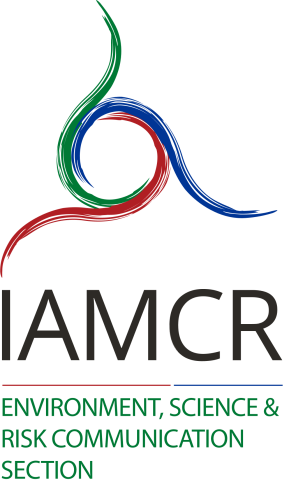
The Environment, Science & Risk Communication (ESR) Section of the International Association for Media and Communication Research (IAMCR) invites the submission of abstracts for IAMCR 2025, which will be held in Singapore from 13 to 17 July 2025, hosted by the Wee Kim Wee School of Communication and Information at Nanyang Technological University.
The deadline for submission is 7 February 2025, at 23h59 UTC.
See the list of all sections and working groups and their remits
See the CfPs of all sections and working groups
IAMCR conferences address many diverse topics defined by our 37 thematic sections and working groups. We also propose a single central theme to be explored throughout the conference with the aim of generating and exploring multiple perspectives. This is accomplished through plenary and special sessions, as well as in many of the sessions of the sections and working groups. The 2025 central theme is Communicating Environmental Justice: Many Voices, One Planet.
Consult a detailed description of the main theme
IAMCR 2025’s central theme speaks directly to the work of scholars in the Environment, Science and Risk Communication (ESR) Section. Our focus on how communication creates, performs, and represents ‘environments’, their science and risks remains the theoretical baseline from which ESR scholarship emerges. In 2025, we will explore the emerging challenges, ethical concerns and opportunities of AI in environmental communication. What are the impacts of AI and technological transformations on humans and the societies they inhabit? What is the role of community engagement in environmental justice? How can new and cultural narratives, and diverse perspectives promote environmental sustainability and justice? What is the role of environmental journalism in environmental justice? What are the risks and challenges faced by climate and environmental journalists worldwide? Beyond this shared platform – and key theme of IAMCR 2025 ‑ we also encourage work that identifies and explores environmental (in)justice and inequality in Environmental, Science and Risk Communication.
While we welcome papers on the main theme and subthemes for IAMCR Singapore 2025, papers from the full range of Environment, Science and Risk Communication topics and perspectives are also welcomed and considered.
Key conference themes for ESR Section in 2025 will include:
- Science, the environment and climate change in popular culture
- Media, advocacy and local/global environmental change
- Environmental and science activism and new media
- Feminist and postcolonial political ecology
- Smart technologies and everyday life
- Science, media and society
- Public/political engagement in science and environment communication
- Social and political uses/constructions of science, nature and the environment
- Science/environmental journalism
- Visual environmental communication
- Science and health-related media panics
- Scientific controversies/environmental crises, spin and news management
- Media-communication roles in environmental crises and disasters
- Media and public understanding of science/environment issues
- Indigenous and First Nations environmental communication research
- More-than-human/interspecies communication
Guidelines for abstracts
Abstracts must be submitted exclusively through IAMCR’s submission system from 3 December 2024 through 7 February 2025, at 23.59 UTC. Abstracts submitted by email will not be accepted.
Abstracts submitted to the Environment, Science & Risk Communication Section should be between 500 and 700 words. It is expected that each person will submit only one abstract. However, no author’s name should appear on more than two abstracts, either individually or as part of any group of authors and authors should not submit more than one abstract to any single section or working group.
Proposals are accepted for both single papers and for panels with several papers (in which several colleagues propose multiple papers that address a single theme). Please note that there are special procedures for submitting panel proposals.
Evaluation criteria
Abstracts will generally be evaluated on the basis of: 1) theoretical contribution, 2) methods, 3) quality of writing, 4) literature review, 5) relevance of the submission to the work of the section, 6) originality and/or significance and (7) Depth of knowledge of the research, theory and/or literature related to the proposed topic as evidenced in the submission. Each proposal must include a clear title, name(s), affiliation, institutional address and email address of the author(s). Bibliographies and author profiles are not required.
Proposals are accepted for both single Papers and for Panels with several papers (in which a group of colleagues propose multiple papers that address a single theme). Please note that there are special procedures for submitting panel proposals. You will find the detailed procedures when submitting your abstract online in the abstract submission system.
Statement on use of AI tools
IAMCR does not encourage or condone the use of generative AI tools to prepare abstracts submitted for consideration for our conferences. IAMCR values originality, integrity, and transparency in academic work, and believes that human-authored contributions best support rigorous and innovative scholarship in media and communication research. Should an author choose to use a generative AI tool in the preparation of an abstract, we require that they include a clear statement within their submission disclosing the tool's use. This statement must specify: (1) the name of any AI tool used; (2) how the tool was used in preparing the abstract, and; (3) the reason for using the tool. Failure to disclose the use of generative AI in accordance with these guidelines may impact the evaluation and acceptance of the submission.
Languages
The ESR Section accepts abstracts in English, French and Spanish.
Deadlines and key dates
The deadline to submit abstracts is 7 February 2025, at 23.59 UTC. For other key dates see https://iamcr.org/singapore2025/keydates. Dates are subject to change.
Contacts
For further information about the Environment, Science & Risk Communication Section, its themes, submissions and multi-paper sessions please contact: Kerrie Foxwell-Norton, Maitreyee Mishra, Joana Diaz-Pont, Pieter Maeseele.










